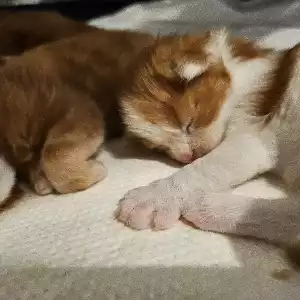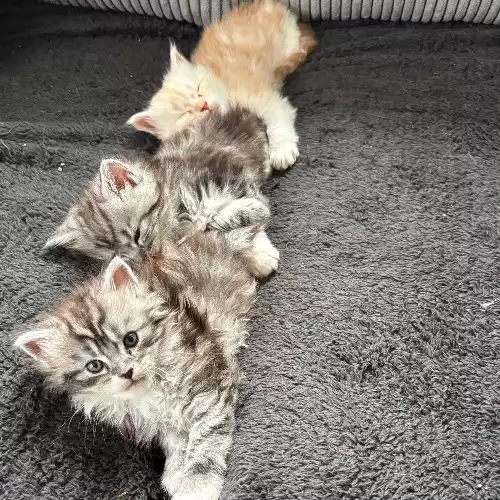The Maine Coon Cat
Known as the Gentle Giant, Maine Coons are renowned for their kind, laid-back disposition. They are very tolerant and gentle despite their size. Though they are often not lap cats, Maine coons are loving but not overly attached, and they love being around people. Many will follow you around, keeping close but allowing you some space.
Maine Coons are recognised for their sweet, friendly nature and are sometimes described as having dog-like behavior - many like playing fetch, following their humans around, and even learning tricks.
Maine Coons are quite talkative, yet they don't meow like other cats. Instead, they chirp, trill, and warble.
Maine Coon Personality & Temperament
They get along well with kids, other cats, and even dogs because they are sociable and friendly. They adjust easily to new circumstances and busy homes. Maine coons are an inquisitive and lively kind of cat. Even as adults, their intelligence and playfulness are very high. They adore games like fetch and interactive toys and puzzles. Some like to play in the water or 'assist' around the house. Main coons are capable of learning commands, tricks, and even how to walk on a leash. They are entertaining and occasionally mischievous due to their skill in solving problems.
They communicate vocally and are distinguished by their quiet warbles, trills, and chirps as opposed to their noisy meowing. They use a variety of sounds to 'talk' to their people. Maine Coons develop close relationships with their people. Even because of their devotion and gregarious disposition, they are frequently referred to as the 'dogs of the cat world.'



3 Female / 2 Male Maine Coon kittens for sale in Litherland
Maine Coon Characteristics
The body of a Maine coon is long, robust, and broad-chested. It has a rectangular body form and a robust bone structure. It frequently takes them three to five years to achieve full size due to their slow growth. They have thick undercoats with longer guard hairs and long, shaggy fur that is semi-waterproof. The ruff around the neck of a Maine coon is particularly noticeable in colder climate areas. They shed seasonally, with the most shedding occurring in the spring and fall.
The ears of Maine coons are big, broad at the base, and positioned high on the skull. Hair inside for warmth and ear tufts that resemble a lynx. Their eyes are broad and round to slightly almond in form. Colours range from gold to green, and white Maine Coons can have blue and unusual eyes. They are expressive and frequently have a 'wise' appearance.
The Maine coon's long, bushy, and full tail, which is used for balance and warmth, is frequently compared to a raccoon's tail. Their huge, spherical paws, are known as 'snowshoe paws' because they frequently have fur tufts between their toes, which aid in walking in the snow.



3 Female / 1 Male Maine Coon kittens for sale in London
Maine Coon Health Considerations
Maine Coons are susceptible to a few genetic disorders that competent breeders check for, just like any other purebreds, however, regular veterinary examinations help prevent health issues because early detection is crucial.
Maine Coons can suffer from frequent health issues like hypertrophic cardiomyopathy (HCM), the most prevalent cardiac condition in cats. Heart failure may result from the illness's thickening of the heart's walls. There is genetic testing for this, and ethical breeders check for it. In addition to genetic testing, which is advised for breeders, heart screenings are particularly crucial for cats that are reproducing or have a family history of HCM.
Their hips may develop abnormally, a condition known as hip dysplasia, which is particularly common in large breeds like Maine Coons. It can cause movement problems or arthritis. Maine coons are susceptible to spinal muscular atrophy (SMA), a hereditary disorder that impacts muscle development and spinal cord neurons. Although it causes muscle weakness, it is not unpleasant. Carriers can be identified by genetic testing. If they don't receive the right dental treatment, they may be susceptible to dental problems, much like many cats.
Maintaining a healthy weight eases the burden on the heart, joints, and teeth through regular brushing and cleanings.



3 Female / 1 Male Maine Coon kittens for sale in London
Maine Coon Diet
Maine coons benefit from a high-quality, well-balanced diet that supports healthy growth (particularly in kittens), muscle maintenance, joint health, and heart health because of their enormous size, moderate growth, and active temperament.
Because Maine Coons are big, muscular cats who require a lot of animal-based protein (fish, poultry, turkey, etc.), they need high-quality protein. Omega-3 and omega-6 fatty acids are good fats that promote the health of the skin, coat, and brain. Taurine, which is present in the majority of commercial cat diets, is an essential amino acid for heart and eye health.
Cats generally don't require a lot of carbohydrates, and too many might induce weight gain, therefore they should be kept under control. The Maine Coon diet requires a lot of vitamins and minerals, but fortunately, well-balanced commercial meals do not typically meet these requirements; therefore, it is essential to choose high-quality cat food.



Female mixed breed Ragdoll & Maine Coon kitten for sale in Glasgow
Maine Coon Grooming Needs
For a long-haired breed, Maine Coons require little care, but routine brushing and simple grooming keep their gorgeous coats tangle-free and healthy. Grooming should begin early in kittenhood so that they are accustomed to handling. Treats and praise can help create a peaceful, upbeat atmosphere.
Unlike some other long-haired cats, such as Persians, Maine Coons don't mat as easily thanks to their silky, semi-water-resistant coat. Their fur is largely self-maintaining because it is naturally adapted to withstand severe weather conditions. They do, however, require frequent brushing (two to three times a week) and more frequent grooming during shedding seasons (spring and fall) due to their size and thick fur. Pay close attention to the places that are most likely to tangle: the belly, chest, underarms, and behind the ears.
Although Maine Coons typically don't require frequent bathing, a bath once in a few months can aid with coat health and shedding. Compared to other cats, several Maine Coons can withstand water better. To maintain healthy claws and prevent overgrowth, regular nail trimming is necessary every two to three weeks.
Regular checks on Maine coon ears are necessary to look for debris, wax, or infection symptoms. If necessary, you can use a veterinarian-approved ear cleaner to carefully clean them. Brushing Maine coon's teeth should be done multiple times a week, preferably every day. Periodontal disease can also be avoided with dental treatments or veterinary dental cleanings.



Maine Coon undefined for sale in Mansfield
















